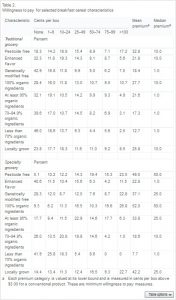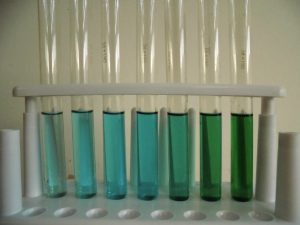There has been a lot of hype and excitement over organic foods and the health benefits associated with “going organic” these past few years. However, one particular experience recently has made me question whether or not the whole “organic movement” is well portrayed to the public or if it is just overrated in general.
One day while at work, a customer comes up to me and asks if we carried frozen organic hamburgers. My initial thought was “Huh, do they even sell such a thing in general?”. But because I have not seen any types of organic frozen hamburgers for sale at any point I have worked or shopped at my workplace, I kindly told her that we, unfortunately, do not carry such a product and that was the end of that conversation. Or at least I thought so. This customer proceeds to ask why we do not carry organic frozen hamburgers and that we should carry it because organic products are, according to her, “healthier and will help you live a longer life”. First of all, that statement is pretty contradictory to me. If one wants to be healthy and eat healthier, frozen hamburgers wouldn’t be on my list of healthy foods to eat. Secondly, how can one conclude that eating organic “will help you live a longer life”? But due to the time restrictions and the ridiculousness of the conversation, I did not ask how one would reach such a conclusion and kindly told the customer that I would make a suggestion to my manager when convenient and that was the end of the conversation (for real this time).
Since then, I have been read a few online articles on organic foods to further educate myself about organic food products and there was one particular article titled “The Dirty Truth About ‘Organic’ Produce” by Henry Miller(5) I found to be very interesting as it summarized my opinions about organic foods in general. Keep in mind I call it an opinion because there is still extensive research and studies made on the difference between organic and conventional food products. This article argues that the idea of organic food products may be misinterpreted by the public and that there may even be further risks when compared to conventional food products.
It seems as if the public classifies organic foods as being “pesticide-free”, but that is not the case. The term “organic” allows for an arbitrarily defined set of principles and techniques to implement the use “natural” pesticides and approved chemical pesticides. In other words, although conventional food products implement the use of synthetic chemical pesticides, organic food products also implement the use of pesticides that pose the same health risks because “organic” pesticides do not just disappear(5). Qualitatively, when comparing the toxic effects of synthetic pesticides to organic pesticides, a research has shown that the exposure to synthetic pesticides are negligible when introduced in small doses such as that in the residues of conventional food products and are only significant when exposed in large doses such as to those working in agriculture(3).
Although some experiments and studies have shown that organic foods contain higher levels of antioxidant and metabolites(2), their actual benefits, if there exists any at all, is unknown and required more scientific investigation(5). Moreover, even with higher levels of antioxidant and metabolites, it is important to note that one trade-off with organic food products is that organic food products are more likely subject to contamination than conventional food products from external sources(4,5). How often do you hear stories on social media about a woman finding a spider inside her organic apple or organic food products being recalled due to E. Coli or Salmonella contamination?
Furthermore, organic farming methods are not as beneficial to the economy compared to conventional farming methods. The cost of processing organic food products which includes providing fertility, weed control, pest control, and disease control combined with the overall reduced yield compared to conventional farming methods is neither efficient nor reliable to the agricultural industry(6). This is also evident because if organic farming methods were more reliable and efficient, one would simply observe a massive upscale movement from conventional farming methods to organic farming methods, but that is not the case(5).

Figure 1: Willingness of Consumers to Pay for Organic Products (1).
In conclusion, organic food products tend to be overrated and do not live up to their standards because of misinterpretations by the public, the potential for increased health risks, and the overall cost-benefit factor in comparison to conventional food products. So next time when shopping, think about whether you really want to pay a few extra dollars for the organic food product- something that is probably only good for bragging to your neighbors about.
Andrew Siu
Chem 300 109
References
- Batte, M. et al. Putting their money where their mouths are: Consumer willingness to pay for multi-ingredient, processed organic food product 2007, 2, 145.
- Brandt, K., Molgard, J.P. Organic agriculture: does it enhance or reduce the nutritional value of plant foods? 2001, 9, 924.
- Holzman, D. PESTICIDES. Organic Food Conclusions Don’t Tell the Whole Story 2012, 12, A458.
- Grob, K. et al. Food Contamination with Organic Materials in Perspective: Packing Materials as the Largest and Least Controlled Source? A View Focusing on the European Situation 2007, 1, 529.
- Miller, H. The Dirty Truth About ‘Organic’ Produce 2015, 1, 1.
- Richards, T. The Economics of the Organic Food Sysytem: Discussion 2011, 2, 322.


